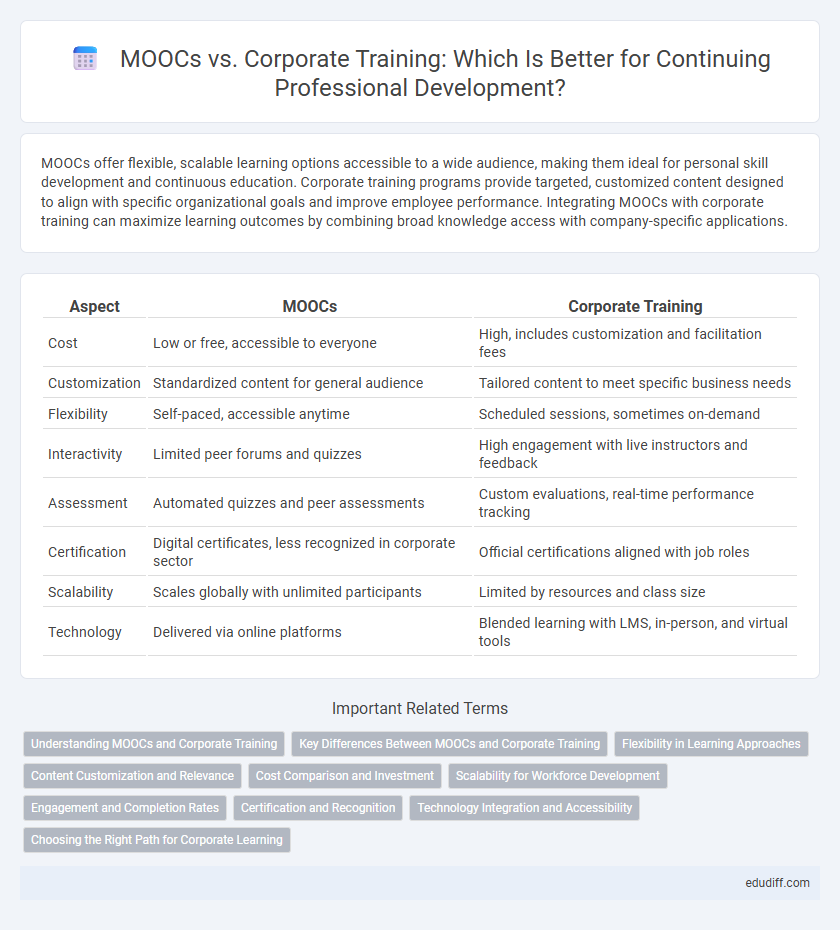MOOCs offer flexible, scalable learning options accessible to a wide audience, making them ideal for personal skill development and continuous education. Corporate training programs provide targeted, customized content designed to align with specific organizational goals and improve employee performance. Integrating MOOCs with corporate training can maximize learning outcomes by combining broad knowledge access with company-specific applications.
Table of Comparison
| Aspect | MOOCs | Corporate Training |
|---|---|---|
| Cost | Low or free, accessible to everyone | High, includes customization and facilitation fees |
| Customization | Standardized content for general audience | Tailored content to meet specific business needs |
| Flexibility | Self-paced, accessible anytime | Scheduled sessions, sometimes on-demand |
| Interactivity | Limited peer forums and quizzes | High engagement with live instructors and feedback |
| Assessment | Automated quizzes and peer assessments | Custom evaluations, real-time performance tracking |
| Certification | Digital certificates, less recognized in corporate sector | Official certifications aligned with job roles |
| Scalability | Scales globally with unlimited participants | Limited by resources and class size |
| Technology | Delivered via online platforms | Blended learning with LMS, in-person, and virtual tools |
Understanding MOOCs and Corporate Training
MOOCs (Massive Open Online Courses) offer scalable, flexible learning opportunities accessible to a broad audience, utilizing diverse multimedia content and interactive forums to enhance engagement. Corporate training focuses on tailored skill development aligned with specific organizational goals, often incorporating hands-on workshops, mentoring, and performance assessments to ensure practical application. Understanding the distinct methodologies and objectives of MOOCs versus corporate training helps businesses optimize talent development strategies for competitive advantage.
Key Differences Between MOOCs and Corporate Training
MOOCs (Massive Open Online Courses) offer scalable, cost-effective learning accessible globally, whereas corporate training is tailored, interactive, and designed to meet specific organizational goals. MOOCs emphasize self-paced learning with diverse content options, while corporate training focuses on employee development through structured programs, hands-on activities, and performance tracking. Data shows corporate training improves skill retention by 30% more than MOOCs due to personalized feedback and collaborative environments.
Flexibility in Learning Approaches
MOOCs offer unparalleled flexibility by allowing learners to access courses anytime and tailor their study pace to fit personal schedules. Corporate training often relies on structured timelines and synchronous sessions, which can limit adaptability for employees with varying workloads. The asynchronous nature of MOOCs supports continuous learning and skill development, making them ideal for diverse professional needs.
Content Customization and Relevance
Corporate training programs excel in content customization by tailoring materials to specific organizational goals, industry standards, and employee roles, ensuring higher relevance and engagement. MOOCs often provide standardized content meant for a broad audience, which can limit their applicability to niche corporate needs. Customizing learning paths in corporate training enhances practical skill development aligned with company objectives, whereas MOOCs offer flexibility but less targeted relevance.
Cost Comparison and Investment
MOOCs offer a significantly lower upfront cost compared to traditional corporate training programs, reducing expenses tied to instructor fees, venue rentals, and printed materials. Corporate training, while more costly, often provides tailored content and direct interaction, which can enhance employee engagement and skill application post-investment. Organizations evaluating cost versus value must consider the long-term return on investment (ROI) from skill retention and productivity gains associated with each training method.
Scalability for Workforce Development
MOOCs offer unparalleled scalability for workforce development, enabling organizations to train thousands of employees simultaneously without the constraints of physical classrooms. Corporate training programs often face limitations due to resource allocation, instructor availability, and geographic dispersion of the workforce. Leveraging MOOCs allows enterprises to deliver consistent, up-to-date content globally, supporting continuous learning and skill advancement at scale.
Engagement and Completion Rates
MOOCs often struggle with low engagement and completion rates, averaging around 10-15%, whereas corporate training programs typically see higher participation due to structured environments and accountability measures. Interactive elements like quizzes, group projects, and gamification significantly boost learner involvement in corporate training compared to self-paced MOOCs. Data from LinkedIn Learning and Coursera highlight that tailored corporate programs achieve completion rates exceeding 70%, emphasizing the importance of personalized content and real-world application.
Certification and Recognition
MOOCs often provide certificates that enhance professional credibility but may lack industry-wide recognition compared to corporate training certifications. Corporate training certifications are typically tailored to specific organizational standards and carry recognized value within the company or sector. Employers frequently prioritize corporate training credentials for their alignment with practical job skills and compliance requirements.
Technology Integration and Accessibility
MOOCs leverage advanced technology platforms like AI-driven personalization and mobile compatibility to enhance learner engagement and accessibility across diverse geographies. Corporate training integrates specialized software solutions such as Learning Management Systems (LMS) and virtual reality simulations to provide immersive and scalable learning experiences tailored to organizational needs. Both approaches continually evolve by adopting cloud computing and data analytics to optimize content delivery and measure training effectiveness.
Choosing the Right Path for Corporate Learning
Selecting between MOOCs and corporate training depends on factors such as scalability, customization, and employee engagement. MOOCs offer broad access to diverse subjects and flexible scheduling, making them ideal for large, distributed teams seeking self-paced learning. In contrast, corporate training provides tailored content aligned with company goals, fostering direct skill development and consistent performance standards.
MOOCs vs Corporate Training Infographic

 edudiff.com
edudiff.com